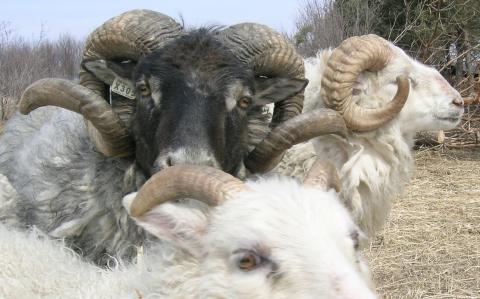Animals
We are focused on sustainability, at Badgersett. One of the principles most agree is critical is "reducing inputs"; i.e. using less gasoline and diesel fuel to raise our food, as well as less herbicide and other pesticides. Small scale growers are not likely to be interested in horses to mow grass between their hazel rows, or sheep to eradicate wild parsnip; but: our numbers so far suggest "less cash out", for larger growers.
In 2015, we've kept horses for 6 years, and Icelandic sheep for 4. No, you can't park them in the barn at the end of the day; nor put them away for the winter. But your tractor does not run on grass, nor does it have babies to replace itself. When done as "whole systems analysis" - we think keeping the animals can pay you; in many ways.
Here we'll talk about our experiences with, and the benefits of:
Cats — eat mice, rats, and other rodents, as humans have understood for millennia. It's why humans took cats in from the wild in the first place; to keep mice out of stored grain and out of the kitchen. We tried doing without them for long years, and proved yet again that cats are the most effective tool for controlling rodents in your operation. Any grain attracts rodents- and any nuts attract rodents far, far, more. Yes, you need to feed your cats just a bit to keep them anchored where you need them, and give a little thought to their care. No, they absolutely do NOT destroy bird populations. That is pure nonsense spread by cat haters and a few naive city dwellers. The truth: cats eat some birds; but NEVER more than would have been eaten by the rats, squirrels, weasels, and mice. Baby birds very rarely grow to be a full year old, under any circumstances. For every time we find a little pile of bird feathers, we have seen our cats killing and eating rodents about 40 times - we've counted. We have cats "anchored" both at the greenhouses/processing buildings and at our home.
Dogs — protect everything. Ours protect the sheep, our home, and the new kittens. The dogs need food, shelter, training, and some veterinarian services. We currently have 3 shepherd-mix rescue dogs. We couldn't do without them.
Sheep
Horses
Poultry


 Badgersett Research Corporation
Badgersett Research Corporation